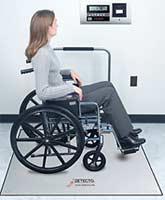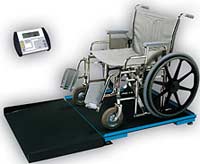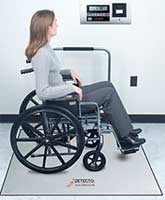Home » Hospital & Durable Medical Equipment » Wheelchair Scales For Convenience And Patient Comfort » Wheelchair Scales For Convenience And Patient Comfort
Wheelchair Scales For Convenience And Patient Comfort

In-Floor Platform Wheelchair Scale w/ Handrail
Retail Price: $5,691.11
Your Price: $5,298.42
 Unit: single
Unit: single

Digital Bariatric Wheelchair Scale w/ Standard Platform
Retail Price: $3,468.04
Your Price: $3,331.36
 Unit: single
Unit: single

In-Floor Platform Wheelchair Scale (48 x 48in)
Retail Price: $5,723.59
Your Price: $5,328.66
 Unit: single
Unit: single
For individuals with mobility problems or those that are unable to move without assistance having the ability to weigh while in a wheelchair provides both dignity and comfort. In the United States it is estimated that approximately 1.6 million people require the use of a wheelchair. This does not count the number of people that use scooters and require support to stand or step up. Providing wheelchair scales is just one way to provide support for non-ambulatory individuals or those with limited mobility.
There are different possibilities for wheelchair scales that range from high capacity through to space saving. Choosing the right style depends on the type of use that will be typical for the device. A few important considerations include the area where the weighing will be completed as well as the need for other equipment in the same space. It is also critical to consider the weight capacity you will need from the scale as is a limit to the amount of weight that a scale is calibrated for. Using the device above its weight capacity will result in inaccuracies in the results as time goes on.
All models of wheelchair scales have a ramp style platform that allows the patient or individual to simply be moved into place on the scale. Different options include kits that can be used with a standard beam scale. These kits have a ramp that sits over the platform and locks into place. When not required the ramp kit can be removed and the device used for mobile patients. This is a good option in general practices where wheelchair patients may not be seen in large numbers. The kits are designed for a specific beam scale and cannot be interchanged between manufacturers or models unless indicated. The reason this is critical is because the ramp frame is designed to balance on the scale it is designed for, allowing the scale to function correctly.
Another good option for space saving wheelchair scales is a model that offers a fold up platform. These are typically wall mount units that will attach to a set position in an examination room or central area. When the device is not in use the platform can be folded up flush to the wall, providing additional open floor space. This feature also prevents people from stepping up onto the platform when it is down.
Choosing a wheelchair scale that offers easy reading from the front and back may be another important consideration on a column or mechanical model. This allows staff to record information from either side of the scale without the need to walk around and leave the patient. Another option to consider is a platform that has a remote LED display. This allows staff to control the readout, change settings, tare for the wheelchair and record patient data all on the keypad. Some models may offer the option to pre-weigh wheelchairs and keep the information stored within the program. When patients arrive the technician simply recalls the weight of the chair on record and tares the scale. This eliminates the need to complete manual calculations or to continually have to weigh the chair and patient separately to get an accurate reading.
Having the option to choose a bariatric scale for wheelchair patients is important in many different settings. A bariatric model that is designed for non-ambulatory patients is wider and heavier and provides additional support even with high capacity. These models, like standard capacity wheelchair scales, are typically designed to weigh in metric or standard. They may also be able to print out the measurement and include a time and date display and the ability to record patient information within the system for quick recall at the next appointment.














